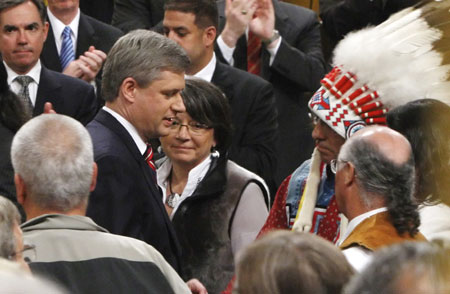When Prime Minister Stephen Harper finally said "We are sorry," tears streamed down the face of Michele Augustine, as well as those of many others who had gathered on Ottawa's Parliament Hill on Wednesday to hear Canada's first ever apology to thousands of victims of the infamous residential schools for aboriginal Indians.
"These are the words that I have been waiting for a lifetime to hear. Today I feel relief. I feel good. For me, this is a historical day," said Augustine, who remains haunted by painful memories of a childhood spent in a distant residential school far from her home in Manitoba.

Canada's Prime Minister Stephen Harper speaks to Assembly of First Nations National Chief Phil Fontaine after issuing an apology in the House of Commons on Parliament Hill in Ottawa June 11, 2008. Canada, seeking to close one of the darkest chapters in its history, formally apologized on Wednesday for forcing 150,000 aboriginal children into grim residential schools, where many say they were abused. (Xinhua/Reuters Photo)
Emotions ran high among the crowds as they saw the Prime Minister appear on the giant TV screens, reading the statement of apology in a significant step toward reconciliation among all Canadians. Many cheered and applauded, but they also had tears welling up in their eyes.
"I stand before you today to offer an apology to former students of Indian residential schools," Harper said in the ten-minute English-French speech at the House of Commons, filled with aboriginal leaders and residential school survivors from across Canada.
"The treatment of children in Indian residential schools is a sad chapter in our history. The government now recognizes that the consequences of the Indian residential schools policy were profoundly negative and that this policy has had a lasting and damaging impact on aboriginal culture, heritage and language," he said.